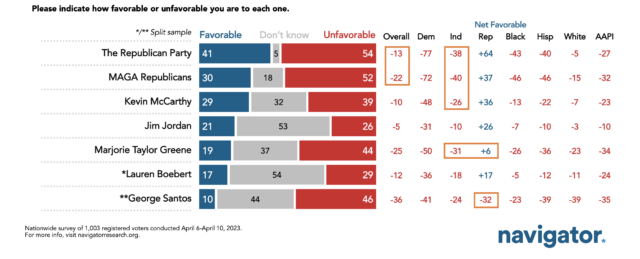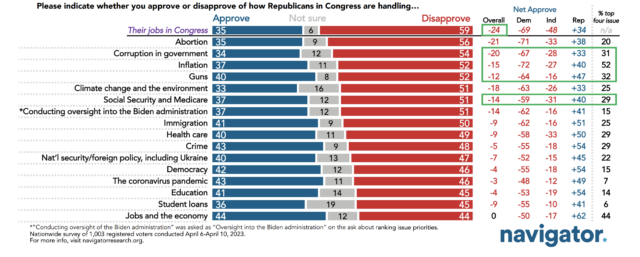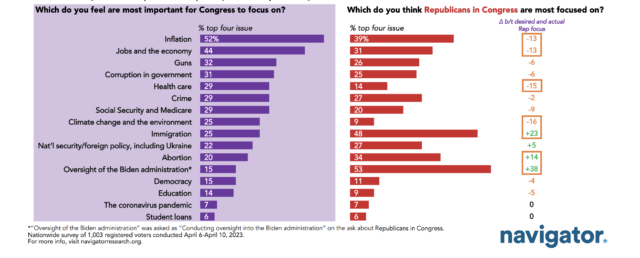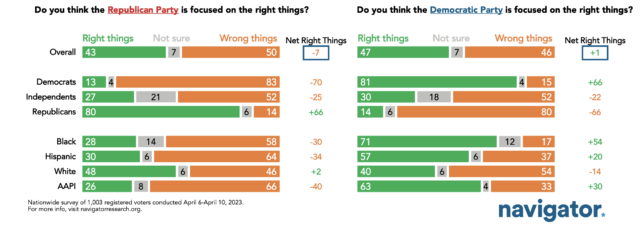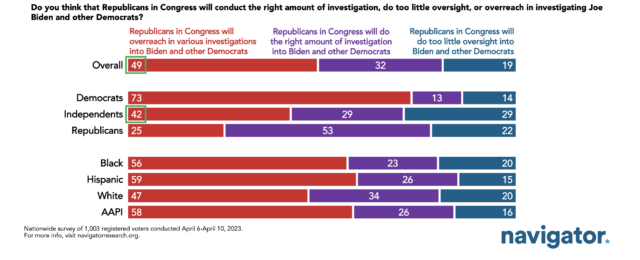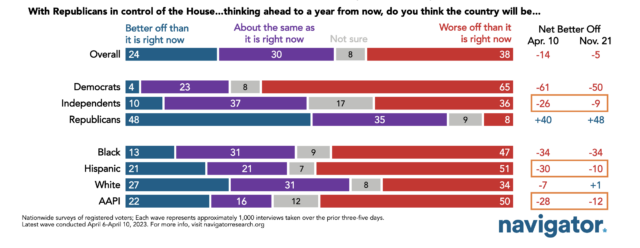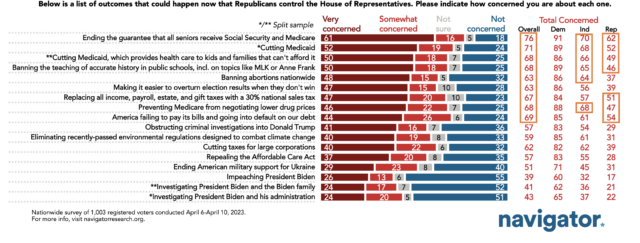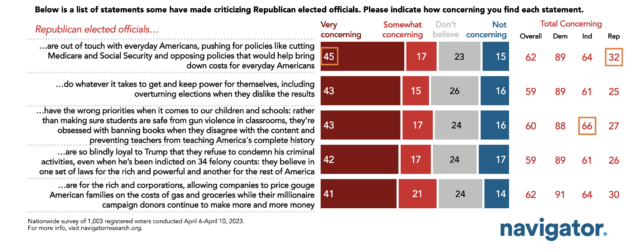- Three in five disapprove of how Republicans in Congress are handling their jobs 100 days in, while the Party and its House leaders are unpopular.
- Americans say Republicans in Congress are too focused on investigating the Biden administration when they want a focus on inflation/jobs and the economy; half say Republicans are focused on the wrong things.
- Americans are most intensely concerned about House Republicans making cuts to Social Security, Medicare, and Medicaid; banning abortion and the teaching of accurate American history; and overturning elections when they dislike the results.
A Range of House GOP Figures Are Deeply Unpopular
Both the Republican Party (net -13 favorable) and MAGA Republicans (net -22) are viewed unfavorably by majorities of Americans.
- Democrats, independents, and each racial and ethnic group hold more negative views than positive views of every Republican group and figure tested, while Republicans hold more positive views of all but George Santos (net -32).
House GOP Are Underwater on Job Approval Overall and on Top Issues: Inflation, Guns, Corruption, Social Security/Medicare
Just a little over one in three Americans (35%) approve of Republicans in Congress overall, while 59% disapprove; they are deeply underwater on top issue priorities like inflation (net -15), guns (net -12), corruption (net -20), and Social Security and Medicare (net -14).
Republicans Are Seen as Too Focused on Investigating Biden and Not Enough on Inflation, Economy, Health Care, Climate Change
More than half of Americans (53%) say Republicans in Congress are focused on “oversight of the Biden administration,” while only 15% of Americans say that is a top four issue priority for them personally.
Half Say Republicans Are Focused on the Wrong Things, While a Plurality Say Democrats Are Focused on the Right Things
By a 7-point margin, Americans say the Republican Party is “focused on the wrong things,” while a narrow plurality say the Democratic Party is “focused on the right things” (net +1).
Americans Think Republicans in Congress Will Overreach in Investigations Into Biden and Democrats
Half of Americans (49%) say “Republicans in Congress will overreach” in such investigations, including a plurality of independents (42%); just one in five (19%) say they will “do too little oversight.”
A Growing Share Say the Country Is Going to Be Worse Off a Year From Now with a GOP-Led House
The Democratic Party Is Viewed as More Empathetic, Albeit not Always Effective
Since last November, optimism about Republican control of the House has deteriorated across partisan and racial lines, but the declines have been most acute among independents (net -26 better off now, down from -9 in November), Hispanic Americans (-30 down from -10), and AAPI Americans (-28 down from -12). Views have also declined by net 8 points among Republicans (down to net +40 from net +48).
Threats to Social Security, Medicare & Medicaid; Bans on History Teaching and Abortion; Overturning Elections Most Concerning
Independents are most concerned about Republicans ending the guarantee of Social Security and Medicare (70% concerned), cutting Medicaid (68%), and preventing Medicare from negotiating lower drug prices (68%).
- Majorities of Republicans are concerned about Social Security/Medicare cuts (62%), a debt crisis (54%), and Medicaid cuts (52%).
A Range of Criticisms on Republican Electeds Are Concerning, Including Being Out-of-Touch With Everyday Americans
Independents are most concerned by Republican elected officials having the wrong priorities when it comes to schools, including focusing on banning books instead of making sure students are safe from gun violence (66% total concerning).

